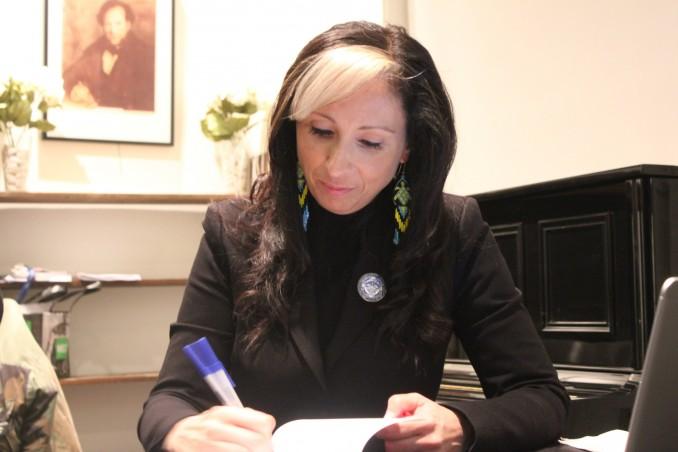By Alanna Rizza
The national inquiry into missing and murdered indigenous women and girls is something everyone can and should get involved in, said a Ryerson professor.
“Indigenous people are not genetically predisposed to violence, these things are created for us,” said Dr. Pamela Palmater.
Palmater is an associate professor and chair in indigenous governance, she is also a Mi’kmaw citizen and member of the Eel River Bar First Nation in northern New Brunswick. She spoke at the Ryerson Aboriginal Student Services annual role model event on Wednesday night. She discussed the past and present issues indigenous people face and how the national inquiry into missing and murdered indigenous women and girls should be a “staged” approach.
Palmater said that the Truth and Reconciliation Commission was a good start and how the Canadian government should repeal and amend all legislation discriminating indigenous people.
She said indigenous people should “set the agenda” on what they want to see in the national inquiry and that they “cannot wait for what Trudeau has to say.” She encouraged everyone to take a government of Canada survey to provide input on the inquiry.
“The inquiry has to proceed under a human rights framework. Not a non-culpability framework, not a framework that is just going to look at a social issue, but a look at it in a human rights context.”
Palmater said that there has never been an inquiry dedicated primarily to indigenous women and girls. She said that male violence against women is a problem around the world, but that it “doesn’t go the other way” and it is especially towards indigenous women.
She said that statistics regarding violence surrounding indigenous people highlight the government’s failure to protect indigenous people.
“The RCMP didn’t help our cause by laying out a bunch of statistics,” Palmater said.
She explained how statistics are usually inaccurate or outdated and that the justice system has a lot to do with the “propaganda and misinformation” of violence surrounding indigenous people. Such violence includes rape, murder and over imprisonment. Palmater discussed numerous cases in which police were the ones committing these crimes.
“Not a single statistic reflected how many of the RCMP were the perpetrators.”
“If the justice system doesn’t care, [then] my goal is to make Canadians care,” Palmater said.
She mentioned several times how it is important for people to stop denying this as an issue and to educate themselves.
This is happening at Ryerson through the increase of courses on indigenous content.
Cyndy Baskin, chair of Ryerson’s Aboriginal Education Council and associate professor in the school of social work, is currently designing a new course to be offered for all students.
“Getting indigenous content in all the programs across the university [is] really critical,” said Baskin.
The course is called Spirituality in Helping Professions and it will explore indigenous spirituality. It will be offered to all students in the Fall of 2016.
Staff and students also think Ryerson should implement the recommendations of the Truth and Reconciliation Commission along with curriculum development.
“People don’t get anywhere by being ignorant,” said Cheryl Trudeau, Ryerson’s coordinator of the Aboriginal education council.
“Mandating some indigenous [content] into curriculumn, a mandatory course or at least an integration in any degree program would be great,” said Emma Beattie, second-year environment and urban sustainability student.
Palmater also thinks people need to recognize how “indigenous women are actually very powerful.”
“The fact that we’ve survived serializations, and them stealing our babies and scalping laws and rapes in residential schools and our sisters and daughters going missing and murdered. We are still taking that big risk to say, ‘We’re not going to take this anymore,’ and we are still doing our best to rise up as leaders.”













Leave a Reply